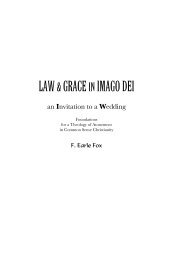Download entire 232-page book HERE (PDF ... - MassResistance
Download entire 232-page book HERE (PDF ... - MassResistance
Download entire 232-page book HERE (PDF ... - MassResistance
You also want an ePaper? Increase the reach of your titles
YUMPU automatically turns print PDFs into web optimized ePapers that Google loves.
in marriage.<br />
The Biblical/civil distinction is very important, however, from a public policy standpoint.<br />
The author, in his capacity as Founding President of the Pro-Family Law Center, had the privilege of<br />
co-authoring a petition to the United States Supreme Court in the case of Lawrence v. Texas (the<br />
sodomy case) asking the justices in advance to reject the Lawrence case for review. Unfortunately, the<br />
court granted a writ of certiorari (agreed to undertake a review) in the Lawrence case and in its ruling<br />
sided with the “gay” movement, stripping states of the right to regulate sodomy.<br />
The Texas law under attack in Lawrence defined sodomy as oral and/or anal sex between<br />
people of the same gender. The case was brought by two homosexual men who had been arrested<br />
for committing anal intercourse in a private home. They attacked the law as unconstitutional for<br />
singling out same-sex couples for prosecution, while not criminalizing opposite-sex sodomy. In<br />
truth, these laws were not being actively enforced in Texas, but the Lawrence plaintiffs, it is alleged,<br />
staged the incident for the purpose of being arrested to gain legal standing to sue for repeal of the law.<br />
The point, however, is that a truly Biblically-informed Supreme Court might never have overturned<br />
the Texas law on the grounds of unequal treatment between same-sex and opposite sex-couples<br />
because it reflected (perhaps accidentally) the authentic Biblical distinction. In short, Biblically there<br />
is no such thing as “heterosexual sodomy.”<br />
A correct understanding of the Biblical principle also helps us overcome two of the most<br />
persuasive (if sophomoric) arguments of “gay” activists: first, that it is wrong and unfair to forbid<br />
“gays” to have a relationship “with the person whom they love.” This characterization of homosexuality<br />
as just another kind of romantic attraction seems quite compelling to the current generation,<br />
especially young women. But when we recognize that God regulates sex because it is only safe and<br />
sanctified within marriage, then we know that romance can never legitimize any non-marital sexual<br />
relationships. (This should be a warning to the church about its increasing willingness to condone<br />
“cohabitation.”) Romantic attraction can be a factor in nearly every type of illicit sexual relationship:<br />
between family members (incest), between people married to others (adultery), between unmarried<br />
people (fornication) and so on. It does not justify any of these sexual unions.<br />
The second argument defeated by understanding the Biblical principle is that “heterosexuals<br />
engage in the same sexual acts, so it is hypocritical for them to single out ‘gays’ for condemnation.”<br />
From a purely spiritual standpoint, the issue is not sexual acts but sexual relationships, so the question<br />
is not what you do, but with whom you do it. If it is a consensual act with your husband or wife,<br />
you’re not under condemnation. If it is with anyone else, you are. As a practical matter, society has<br />
an interest in preserving public health, and it is arguably reasonable for government to criminalize<br />
certain acts, such as anal intercourse, which is the primary means of transmission for certain diseases<br />
such as AIDS. However, even in this situation, no one who obeys the Biblical instruction to be<br />
abstinent before marriage and faithful within it will be at risk of catching or transmitting these diseases<br />
through sex. In contrast, most non-marital heterosexual relationships tend by nature to be promiscuous<br />
and “adventurous” (some would say “reckless“) and thus highly risky; all the more so homosexual<br />
relationships, since normal intercourse is not even an option in them.<br />
An excellent source of additional information on homosexuality from a Biblical perspective<br />
is the website of Dr. Robert Gagnon of Pittsburgh Theological Seminary: www.robgagnon.net.<br />
Redeeming the Rainbow 18






